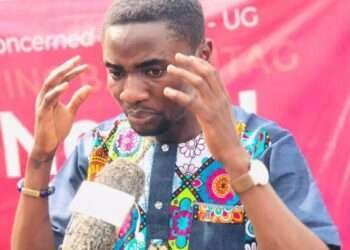The recent apology by Ghana’s Finance Minister, Dr. Mohammed Amin Adam, for the hardships caused by the Domestic Debt Exchange Programme (DDEP) has sparked considerable debate as the nation prepares for the 2024 elections.
Mr. Aidoo, Gilbert Arhinful, a respected lecturer at the Department of Political Science of the University of Education, Winneba, in an interview with the Vaultz News highlighted the importance of sincerity in political apologies, particularly from high-ranking government officials.
Mr. Arhinful acknowledged that it is sometimes necessary for leaders to recognize their faults and seek reconciliation. However, he raised concerns about the context and tone of the Finance Minister’s apology, questioning whether it was a genuine expression of remorse or a calculated political move aimed at appeasing voters.
“It is good to recognize when you have erred and to seek reconciliation with those you have wronged. However, this apology, given the context, raises several questions. Was it a sincere admission of fault, or merely a calculated move to appeal to the emotions of the electorate?”
Mr. Aidoo, Gilbert Arhinful, Lecturer at the Department of Political Science, UEW
According to Mr. Arhinful, an effective apology should demonstrate empathy and acknowledge the pain caused by the policies in question. He criticized the Finance Minister’s apology for failing to meet this standard, pointing out that while the Minister sought forgiveness, he simultaneously praised the very program that had caused widespread suffering.
This contradiction, in Mr. Arhinful’s view, undermines the sincerity of the apology and raises questions about its true intent.
Mr. Arhinful highlighted that one of the most puzzling aspects of the Finance Minister’s apology is the apparent contradiction in his message.
“While apologizing for the hardships caused by the DDEP, he simultaneously touted the program as one of the most successful initiatives undertaken by the current government. This dichotomy has not gone unnoticed by the public or by political commentators.”
Mr. Aidoo, Gilbert Arhinful, Lecturer at the Department of Political Science, UEW
Another key issue raised by Mr. Arhinful is the contradictory messaging within the government. While the Finance Minister has taken the unusual step of apologizing, other government officials have continued to project an image of success and prosperity.
“For instance, NPP’s Ashanti Regional Chairman, Bernard Antwi Boasiako, famously known as Chairman Wontumi, recently claimed that Ghana’s economy is performing better than the UK’s.”
Mr. Aidoo, Gilbert Arhinful, Lecturer at the Department of Political Science, UEW
Mr. Arhinful emphasized that such statements further complicate the narrative and may erode the credibility of the government’s apology.
This disconnect between the Finance Minister’s apology and the broader narrative pushed by government communicators, according to Mr. Arhinful creates confusion and casts doubt on the government’s accountability.
Mr. Arhinful also noted that this lack of coherence within the government’s messaging could diminish the impact of the Finance Minister’s apology on voter behavior.
“If the apology is perceived as insincere or inconsistent with the government’s overall stance, it may not resonate with the electorate or influence their decisions at the polls.”
Mr. Aidoo, Gilbert Arhinful, Lecturer at the Department of Political Science, UEW
Political Calculations Behind the Apology
It is difficult to ignore the timing of the Finance Minister’s apology. With elections on the horizon, many see this as a tactical move to mitigate potential losses at the polls. However, Mr. Arhinful and other analysts argued that the apology might be too little, too late.
“Many voters have already made up their minds. For those who have suffered because of the DDEP, an apology may not be enough to change their vote. It could even backfire if perceived as insincere or manipulative.”
Mr. Aidoo, Gilbert Arhinful, Lecturer at the Department of Political Science, UEW
Moreover, Mr. Arhinful pointed out that the opposition parties, particularly the National Democratic Congress (NDC), could capitalize on the government’s missteps. However, he cautioned that the NDC must do more than simply criticize the ruling party; they must also offer a compelling alternative vision for Ghana’s future.
While the NDC has proposed policies such as a 24-hour economy, Mr. Arhinful noted that the party has yet to provide sufficient details on how these policies would be implemented and how they would address the current economic challenges.
Challenges Facing Ghana’s Electoral Landscape
The interview also touched on the broader challenges facing Ghana’s electoral landscape. Mr. Arhinful lamented the dominance of the two main political parties, the NPP and the NDC, which he described as a “duopoly.”
Mr. Arhinful argued that this two dominant parties limits voters’ choices and forces them to choose between two imperfect options.
“As a result, elections in Ghana have become more about choosing between the proverbial deep blue sea and the devil himself. None of these are better. “
Mr. Aidoo, Gilbert Arhinful, Lecturer at the Department of Political Science, UEW
Mr. Arhinful urged Ghanaians to demand more from their politicians and to hold them accountable for their actions. He emphasized the importance of transparency, accountability, and sincere communication in restoring public trust in the political process.
He also called on the Electoral Commission and other relevant bodies to ensure that the upcoming elections are conducted fairly and transparently, so that the results are credible and accepted by all.
Mr. Aidoo calls for a shift towards greater accountability, transparency, and genuine engagement with the concerns of the Ghanaian populace. He urged political leaders to embrace humility, acknowledge their shortcomings, and outline concrete plans for addressing the nation’s challenges.
Furthermore, he emphasized the importance of fair, transparent, and accountable electoral processes, hoping that the forthcoming elections will pave the way for leaders who prioritize the welfare of the citizens over their personal interests.
READ ALSO: More Than 75,000 People Displaced In Southwest Gaza





















